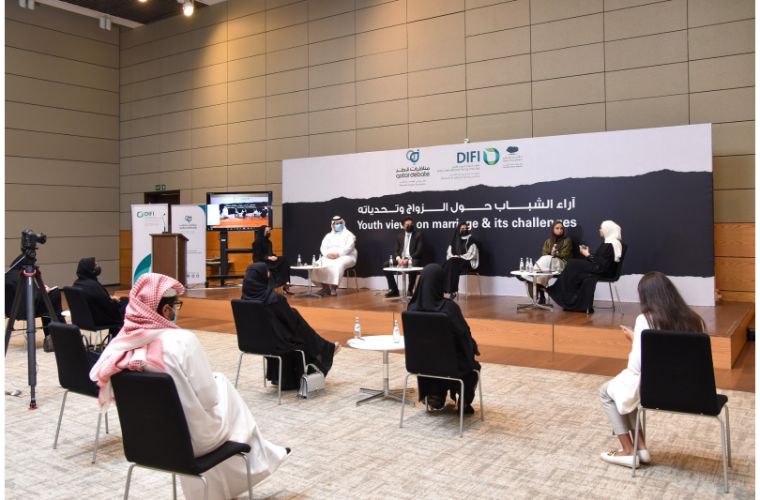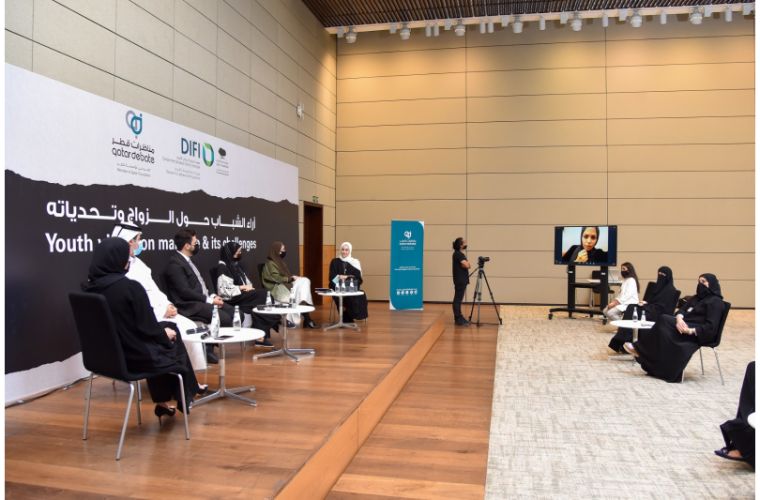QF member captures youths’ perspective on what influences marital relations
The ever-changing marriage institution has witnessed more shifts due to tectonic changes in society today in terms of access to information, information sharing, and social trends, and has thus come to be perceived in a different light by young people.
To capture Arab youths’ views on marriage, Doha International Family Institute (DIFI), a member of Qatar Foundation (QF), organized a series of youth group discussions in three strategic Arab countries titled, ‘Youth Views on Marriage and Its Challenges’.
DIFI first held the event in Morocco in collaboration with the National Institute of Social Work, then in Jordan in partnership with the National Council for Family Affairs, and lastly in Qatar in collaboration with the QatarDebate Center – a member of QF.
The live discussions were held through the fusion of in-person and virtual events, convening almost 100 participants representing the Arab youths who shared their perspectives on marriage, their aspirations towards it, the social and economic factors they believe affect marital relationships, and the challenges they face upon getting married.
Dr. Sharifa Noman Al Emadi, Executive Director of DIFI, said: “Marriage is the foundation of a healthy family and consequently of a strong society. With changing perceptions and attitudes towards marriage, we must create a social infrastructure that supports forming and sustaining healthy marriages. These discussions give us insight into the future generation’s views on marriage, and this understanding helps us advocate expedient policies and support systems.
“We were very pleased to see forward-thinking youths coming from different backgrounds participate in the events, and thus making the discussions very interesting and insightful. I look forward to sharing our findings before our upcoming international conference in February 2021.”
The successful Moroccan youth engagement was moderated by Touria Houssam, Professor of Sociology at the National Institute of Social Work in Morocco. She said: “The workshop provided important opinions from married and unmarried youths aged between 18 and 30 years.
“This resulted in a very rich workshop, and the biggest proof of that is that it took longer than planned, due to the attendees’ enthusiasm and participation. We hope the next DIFI conference in February 2021 is going to be successful.”
Imane Haidasse, a student at the National Institute of Social Work, who is about to get married, echoed Houssam’s sentiment, saying: “This workshop offered me a chance to express my opinion on the topic of marriage based on my intellectual and cultural background. At the same time, it allowed me to learn the opinions of others who expressed their views based on their intellectual and cultural reference in an exchange featuring a rich diversity in opinions.”
With almost 30 youth participants, Jordan saw an animated discussion particularly during the Q&A session. One of its participants, Afnan Haloush, Project Manager at the East and West Center for Sustainable Development, said: “The researchers posed excellent questions that enriched the discussion and allowed participants to discuss the topic from different standpoints, to think about it, and express their opinions comfortably.”
The discussions also tackled the impact of COVID-19 on marriage, the effect of digital technology and social media on the choice of partner and marriage stability, as well as the potential measures each country can take to address challenges affecting marriage.
Nadia Darwish, Debate Instructor at QatarDebate Center and the moderator of the discussion held in Qatar, commented: “This session is significant for providing young people with the opportunity to present the challenges that they face in marriage, as they are the ones directly concerned with these difficulties in different environments and circumstances. This discussion changes the way society looks at such difficulties, or renders solutions more relevant to youths, so as to form healthy and sound marriage relationships in society.
“Such discussions held with the required group make conferences more effective in terms of applications on the ground, as they allow collecting views that are taken into account in state decisions. Moreover, fixed views in society must be approached in a straight forward manner, and brought to the table so as to discuss the current problems and challenges young people face, whether in terms of choosing a partner in traditional or non-traditional ways, the importance of marriage, responsibilities in a marriage institution, and which responsibility either spouse ought to handle, as well as other issues. Such issues have partly caused the formation of unhealthy relationships, delay in marriage, or unease about building a well-balanced family’.”
Abdullah Jassim Al-Kubaisi, a member of the Qatar National Debate Team, was one the speakers during the last event. He said: “I shared the views of young people on marriage and the delay in marriage. As young people about to get married, we find this an opportunity to talk about the social challenges, as well as society’s perspective, and its impact on this institution.”
The series was organized in cooperation with regional partners as part of adjunct events leading to the DIFI international conference titled, ‘Marriage: Formation and Constituents of Stability’, taking place from February 23-25, 2021.
The international event will convene social scientists, policymakers, NGOs, practitioners, youth, and CSOs to discuss the topic of marriage in the Arab region at large, and all relevant factors related to marriage and family. A day before the event, DIFI will present the findings from the youth discussions.
YOUTH IN MOROCCO, JORDAN, AND QATAR SHARE VIEWS ON MARRIAGE IN DIFI DISCUSSION SERIES
Dec 22, 2020 by bcw-global



